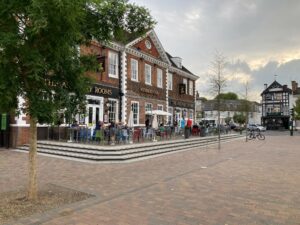Support us from £3/month
We deal with almost 1000 cases a year assisting communities, groups and individuals in protecting their local spaces and paths in all parts of England and Wales. Can you help us by joining as a member?
We are working with Living Streets and the Ramblers to persuade the House of Lords to adopt our amendments to the Levelling Up and Regeneration Bill (LURB) to keep pavements free for the public.

The Assembly Rooms in Epsom is using an extensive part of the highway, but pays nothing apart from a small licence fee. Photo: Open Spaces Society
During the pandemic, the Business and Planning Act 2020 was introduced temporarily to streamline the procedure for allowing eating, drinking, and serving of food outdoors on public pavements and pedestrianised roads, so as to benefit businesses and customers. The government proposes to make these changes permanent in the LURB.
We have argued that the proposals have consequences, which include the following.
They allow the licenced area to take up part of the pavement but not the carriageway, protecting the vehicular space while reducing pedestrian space.
They provide few reasons why a local authority may wish to refuse a licence application. We say that refusal should be an option if the proposals would (a) interfere with pedestrian flow, (b) leave the pavement so narrow that pedestrians are forced into the road to pass each other, or (c) cause significant additional risk to vulnerable users of the pavement.
They allow a restaurant proprietor to privatise a piece of public space for profit-making activities, while the highway authority remains responsible for its maintenance. The licensee should contribute to the maintenance costs and, we suggest, share some of the profits with the local authority.
They impose no requirement for tables and chairs to be removed overnight, potentially causing a higher risk of accident for pedestrians.
They provide that the public consultation period on an application is only 14 days from the date the application is made, not accounting for local authority delays in publicising it.
They also provide that the local authority has only 14 days to determine an application after the close of the consultation period, giving such licences unwarranted priority. Why should an applicant for a definitive map modification order have to wait perhaps 20 years — but an applicant for a pavement licence is guaranteed a determination within 28 days?
And a local authority would be able to grant a licence for a privately-owned and maintained public street — without any consultation with the street owner.
We assisted with amendments considered by Public Bill committee in the Commons on 18 October 2022, but they were swatted away by the Parliamentary under-secretary Dehenna Davison with inadequate explanation.
We have provided amendments to address all these consequences, and hope that they will be incorporated into the bill.
